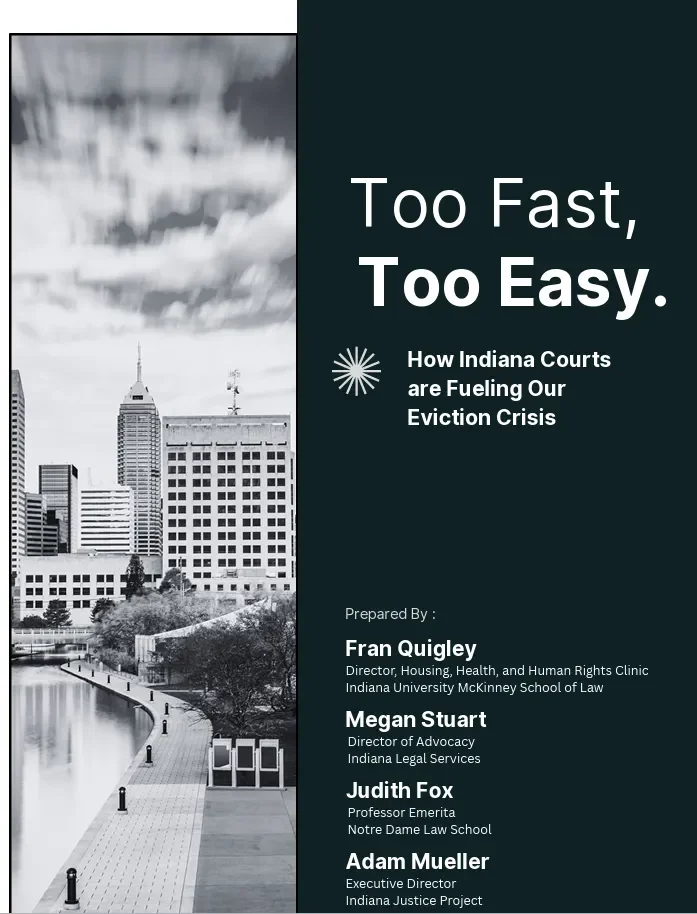Your Honor, You Can Fix This
What Judges Can Do to Ease Our Housing Crisis
This piece originally appeared on Fran Quigley’s blog Housing Is A Human Right on September 12, 2025.
This week, I had the privilege of joining with colleagues from Indiana Legal Services, the Indiana Justice Project, and Notre Dame Law School to publish a report: Too Fast, Too Easy: How Indiana Courts are Fueling Our Eviction Crisis.
Our report addresses the injustices in our state’s courts specifically. But both the problems and the solutions apply to most eviction courts across the country, as researchers like Rutgers Law School professor Kathryn Sabbeth (quoted in our report) has said for years.
As the report title suggests, the core of the injustice is that our courts make evictions too fast and too easy:
Too Fast: Unlike most legal disputes, which move slowly and allow for careful consideration, eviction cases are rushed through at extraordinary speed. Tenants are often given only a few days’ notice before their hearing, and many hearings last less than five minutes. Families facing the loss of their homes, one of the most impactful decisions a court can make, are afforded far less time to prepare and defend themselves than the courts provide for people responding to routine contract disputes, injury cases, or family law matters.
Too Easy: A court order displacing a tenant from her home is commonplace. It happens thousands of times a week across the country. But in most other types of legal cases, this kind of result is very unusual. The law strongly prefers money judgments over ordering a party to do something specific, like move out of their home. The legal term for when a court forces a tenant from her home is an injunctive order. In no other legal dispute does a defendant face the prospect of routine, near-immediate injunctive orders.
Yet this otherwise extraordinary outcome is the norm in evictions. Worse yet, the tenants almost never have an attorney arguing against it. Nationally, 90% of tenants go to eviction court without an attorney, while landlords virtually always have a lawyer. That sets the stage for crowded dockets with sometimes hundreds of cases, where landlords’ attorneys quickly obtain court orders evicting dozens of tenants at a time.
So our report proposed four court reforms, all of which should happen across the country:
Provide Tenants Adequate Time to Prepare: Delay eviction hearings until at least 21 days after notice is served—a timeline that is already the law in other civil cases--and require an initial status hearing before any eviction judgment is issued. Giving a tenant even a few extra days can allow time to come up with rent that is due or to find another home for their family—and thus prevent homelessness.
Require Mediation Before Filing and Before Judgment: Make eviction a last resort by requiring pre- and post-filing mediation to resolve disputes. Courts already require mediation in other cases that pose far lower stakes than the loss of a home.
Allow Rent Escrow for Substandard Housing: Enable tenants to pay rent into escrow accounts when landlords fail to maintain safe and habitable living conditions. This would avoid immediate eviction and protect both the tenant and the landlord. Many states already allow this. Sadly, Indiana and a handful of others do not.
Seal Eviction Filings Until Final Judgment: The minute an eviction case is filed, the named tenants are subject to “Scarlet E” blacklisting by prospective landlords who see the case in public records. To prevent that harm, courts should keep eviction records confidential unless and until a final judgment is entered.
These practical reforms are already in place in other states. They even have been piloted successfully in a few courts in our state. These changes would restore fairness, reduce homelessness, and protect the integrity of the court system.
Alone, these reforms won’t fully fix our housing crisis. Legislation that increases the filing cost for evictions and pairs rent control with good-cause eviction requirements is necessary. And the end game is far more and higher-quality public housing and housing subsidies for all who qualify.
But, on the path to those better days, our courts need to stop punishing the vulnerable and eroding public confidence in the judiciary. If they take action, our courts can stop fueling our eviction crisis and finally become part of the solution.

